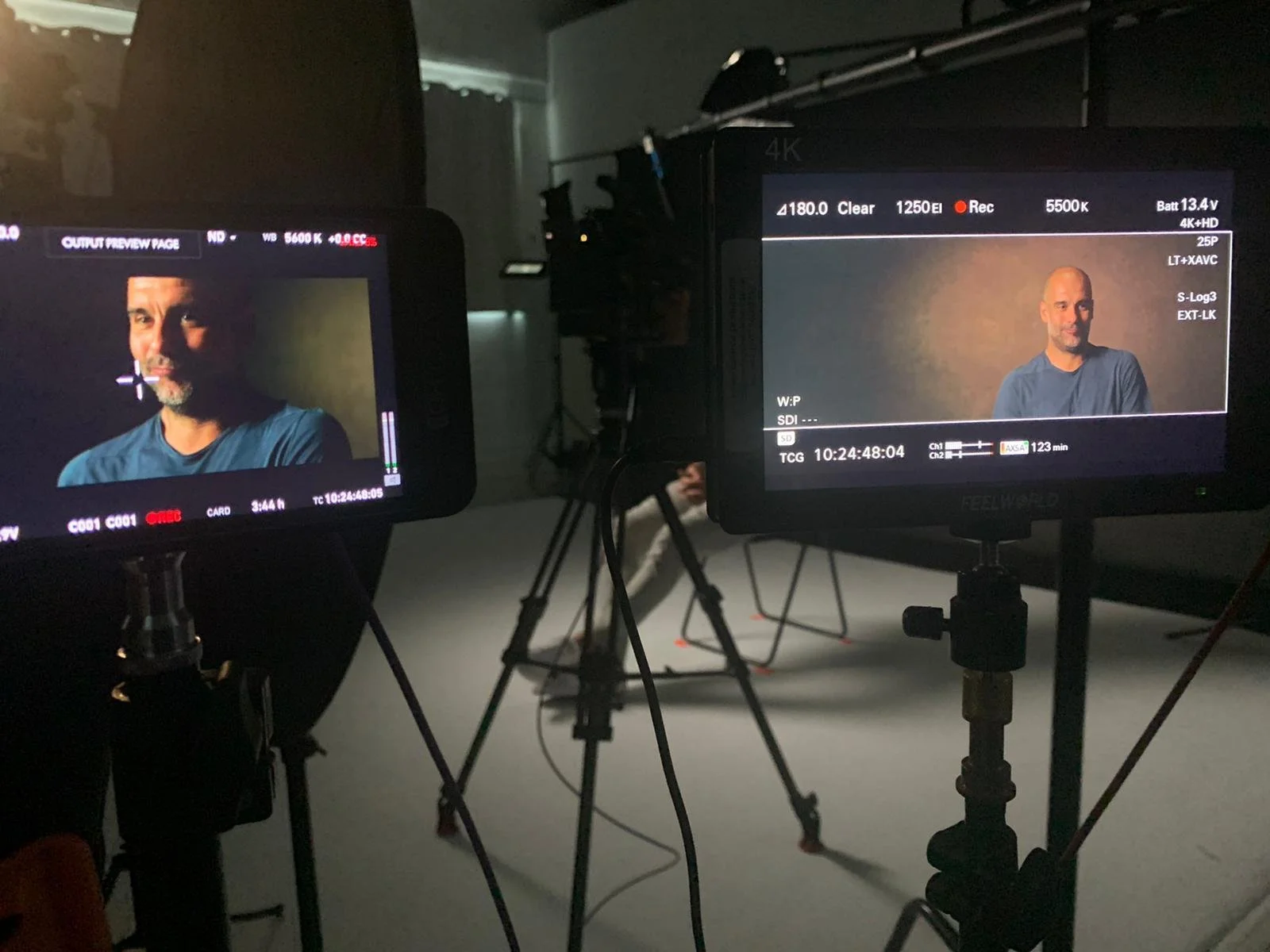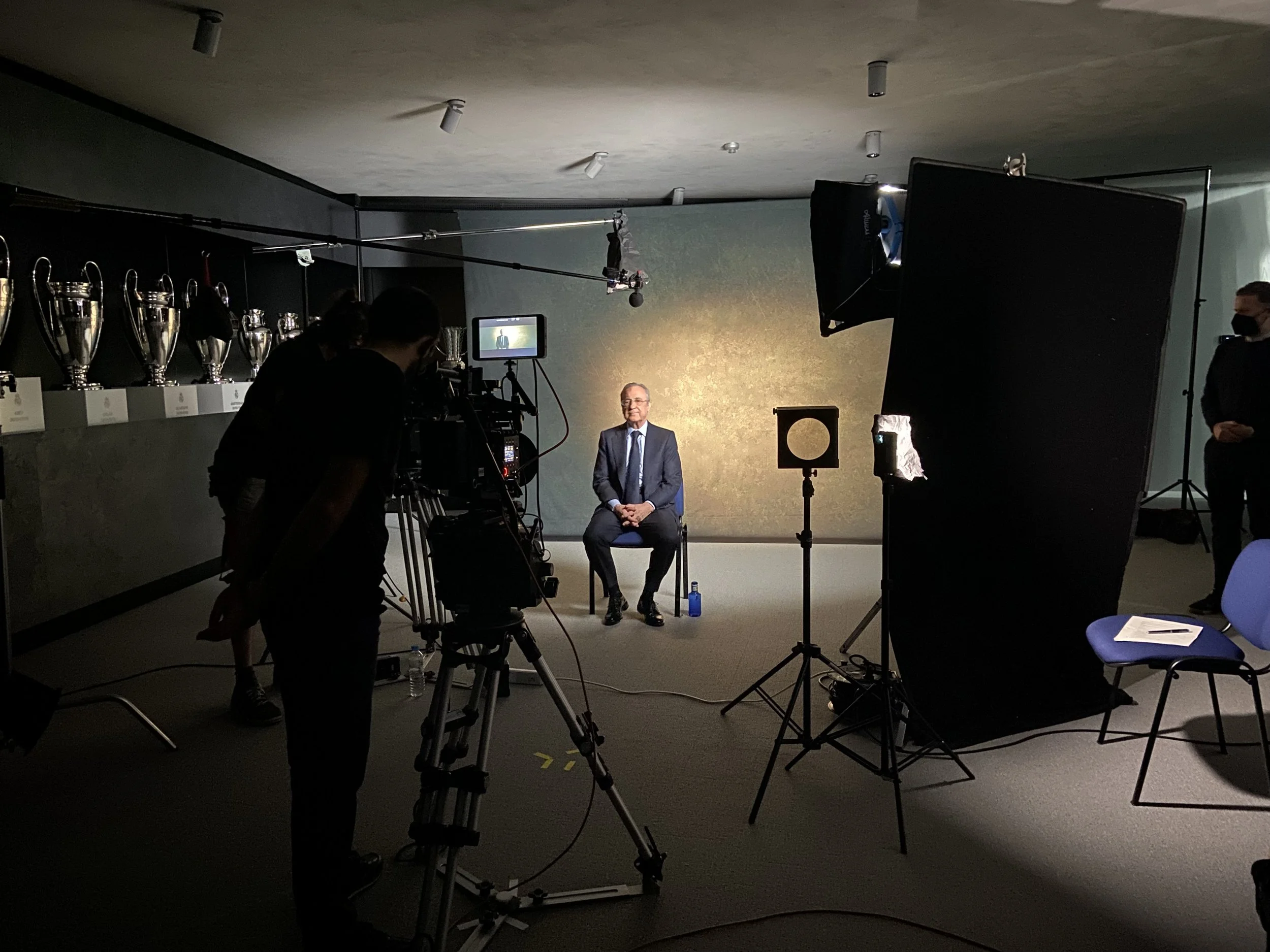The Figo Affair: The Culture Division Meets Directors Ben Nicholas and David Tryhorn
The Péle directors turn their attention to the political string-pulling and trickery behind the most infamous transfer in modern football history.
“Welcome to football in its purest form,” affirms the Spanish commentary. But the opening flashes of grainy film in The Figo Affair look more like an uprising than a football match: dark streets lined with tempestuous crowds; fiery flashes of red flares; a Barcelona shirt set alight by a group of match-goers; the Real Madrid team bus speeds through via Police escort. “One of world football’s great derbies,” it declares.
These are the opening shots of Ben Nicholas and David Tryhorn’s latest film: The Figo Affair: The Transfer That Changed Football. We sat down with the pair of them to discuss their approach to filmmaking, the challenges of piecing such a thrilling plotline together, and what it’s really like to sit face-to-face in a dark room with Florentino Pérez.
“We were always quite adamant from the outset that this needed to be seen as a heist movie.”
The Figo Affair (El Caso Figo) is the latest in an impressive canon of biographical feature documentaries on some of sports’ most elusive stories made by the pair. It follows the controversial transfer of Luís Figo from Barcelona to Real Madrid in 2000, and the breathless political maneuvering, scheming and conspiring that helped make it happen.
They joined forces in 2014 to work on a TV series blending sports and politics that never went into production. “I’m not sure that ever saw the light of day,” David candidly admits. But after working together on Crossing the Line in 2016 – a film about Olympic hurdler Danny Harris, they went from strength to strength.
David (left) and Ben (right) have worked together since 2014.
In 2021, they added Netflix’s Pelé to their repertoire. It was a sensation, and put the pair on the map in a footballing sense, at least.
It makes The Figo Affair their second documentary to be released by Netflix, with further subjects in the pipeline. But according to Ben, that’s where the similarities end.
“It was very different to Pelé in that we could drill into a small period of time,” he admits.
“It [the Pelé film] was a war of attrition at times. A three-year-long thing, trying to make a cinematic story about a man’s life and to crystalise his importance. Whereas this was much more focused on a three-week period. We really liked the idea of drilling into the transfer, so that summer is kind of the whole story.”
But as David explains, that didn’t make this latest project any less challenging. “There were three major things that I thought would be really difficult. The first was whether there would be any archive footage; this is a story that largely plays out behind closed doors. Are we going to get everyone involved in the deal [to talk about it]... these are some pretty powerful, important people! And if we get all that, are any of them going to speak openly, honestly at length about this? So, going into the film we had these three quite major reservations.”
“It’s the kind of story we’d have been really into,” Ben adds. “We’d have read a long form article or a book about it, but we were thinking: is it a film? If you’re kept at arms’ length, you lose interest, so we knew the only way to really do it was to involve as many people who were in the room – doing the deal – as possible.”
“It’s exciting though, when he walks into the frame. For us, behind the camera, it was incredible.”
The result is an ensemble of characters who, like in one of those elaborate, Italian Commedia dell’arte renaissance plays, fulfil different roles bordering on the sublime, at times.
There’s José Veiga – Figo’s agent, and Paulo Futre, ex-Portugal and Atlético Madrid player – who play the court jesters, who seem to be perpetually meddling and scheming. There’s Joan Gaspart, the scorned, once-great King, who sees his empire and prized-possession slip from his fingers.
There’s Pep Guardiola, the loyal friend who serves as a proxy for the whole Barcelona fandom. In fact, Pep’s inclusion represents something of an emotional barometer for various interests in the film. “He plays a role we didn’t expect him to play initially,” Ben reveals. “One of the happy accidents is that Pep becomes the representative for Barcelona, he does it really well.”
Pep Guardiola, on set.
“He’s kind of the scorned Barcelona fan, as well,” David adds. “He has this real authenticity about him. One of the closing cards we have mentions how Pep becomes one of Barcelona’s most successful ever coaches. And you feel that if it played out differently, Figo could’ve been there as his assistant manager or something.”
And there’s Florentino Pérez, the ambitious and power-hungry climber, seizing his opportunity. Today, his aura is as big as football itself. He’s measured – composed, and safe in the knowledge of his supremacy. But The Figo Affair shows a side of Pérez that we’ve not witnessed for a long time: the tenacious, risk-taking, bullish civil engineer turned presidential candidate. It feels more like a precursor to the Pérez we know today: “This is his origin story,” as Ben perfectly captures.
Getting him on board was essential. “The one we knew we had one shot with was Florentino,” David explains. “We really bided our time on that. We asked a lot of Spanish journalists about the best approach, and he very kindly agreed to give us a limited amount of time, at Real Madrid. One of the Madrid guys told me: ‘I’ve been here since 2005, this is only the second time he’s done an interview like this!’ – so we were nervous. They even insisted that it [the interview] had to be done in the Real Madrid trophy room, that we couldn’t have our backdrop,” David continues, laughing at the incredulity of the situation.
Ben interjects: “It’s exciting though, when he walks into the frame. For us, behind the camera, it was incredible.”
Florentino Pérez in the Real Madrid trophy room.
And he’s not wrong. As the Spanish rumour mill about the transfer reaches its frenetic crescendo, the commanding footsteps of Florentino Pérez, taking his seat and fixing his jacket, before looking down the camera, cut the noise of the film to a silence. As a viewer, you know you’re about to hear the story from Pérez himself. It feels like a privilege.
The various roles played by the characters are given added importance in unravelling a story of trickery and deceit of Shakespearean proportions.
“One of the things I like now, looking back, is that you never really know who to trust,” Ben says, pondering the back-and-forth of the films’ narrative swing.
“From the outset,” David adds, “we were always quite adamant that this needed to be seen as a heist movie. You’ve got Figo and his Hollywood good looks, he’s the shiny diamond that Florentino Pérez is trying to steal for his own grab of power, and to undermine his biggest rivals.”
“But then as things developed, we realised it was actually kind of a double heist. One is Pérez going after Figo – the shiny diamond. The other is Veiga and Futre going after the six million euros in commission. With these two heists going on, Figo becomes a shiny pawn. The agency is taken out of his hands.”
It wasn’t just the superstar cast of characters getting on board that propelled the story forward. The gravitational pull of Real Madrid and Barcelona as entities in not only Spanish football, but Spanish life, means they dominate news cycles. As Ben continues, that omnipresence delivered a perfect archive. “Luckily, there were elections going on in Spain at Madrid and Barcelona at the same time. Every night on the news, it’s: ‘fans are angry or happy about this… he said this…’. That archive meant we could cinematically put the story together day by day, and illustrate its ups and downs.”
Perhaps the films’ most intimate footage, of Figo on holiday in Sardinia in the middle of a frenzy of rumours and chaos back in Spain, arrived late in the day. “We spent a long time trying to persuade Figo to go into his attic and dig out his home DVDs. That footage only arrived about a month before the edit.”
The film intersperses archive newsreels and bulletins from Spanish TV channels with intimate interview narration. This style, which hands the pace of storytelling over to the people who were there, while allowing the chaos to play out in real time, is a watermark of Ben and David’s filmmaking, and was a conscious decision taken during the production process.
“Journalistically, and from a filmmaking point of view, it’s better to have all these different views contradicting each other – to let the viewer make up their mind as to who is telling the truth,” David says. “Otherwise, it becomes us trying to tell our truth, which is just another version of the story.”
“I think that’s the strength of the film,” Ben adds. “That we’re never being didactic.”
The one absence from the cast is perhaps the most famous. “It’s a bit of a misnomer in a cinematic sense. It wasn’t really noticed at the time. It was picked up three or four days later on like the Wednesday night news bulletin. It wasn’t instructive to the moment.” Ben is – of course – talking about the pig’s head.
The most infamous suckling in football history – thrown onto the pitch by Barcelona fans in the 2002 El Clásico – is often the first thing mentioned in relation to the Figo transfer. But Ben and David’s commitment to the chronology of the film outweighed the temptation to throw it in there, despite the visual value. “I get that it’s amazing imagery,” David says. “But it would be the only time in the film where someone would be speaking retrospectively about something. We didn’t want to break the grammar of the film, playing out in present tense.”
“It was also one of those things where the more people mentioned it, the more I didn’t wanna do it,” adds Ben, wearing a satisfied grin. As with most legends, the truth of the moment is often the least compelling part.
Perhaps The Figo Affair’s crowning glory is how it resonates. In crafting the film this way, Ben and David have immortalised a watershed moment in modern football history. Figo’s transfer was ground zero. The first modern football transfer. As David puts it, football’s “grubby underbelly” is laid bare. “We try not to think it exists,” he says.
“But we know it does.”
The Figo Affair: The Transfer That Changed Modern Football is available to stream now on Netflix.





